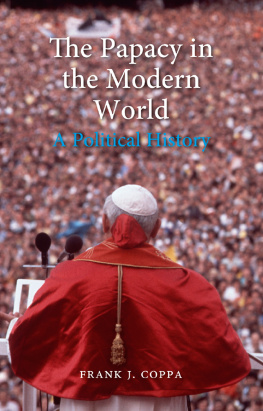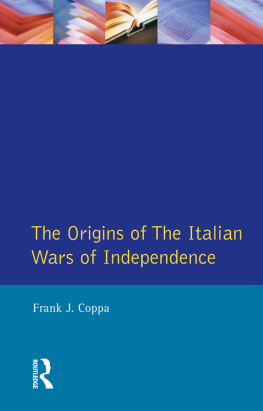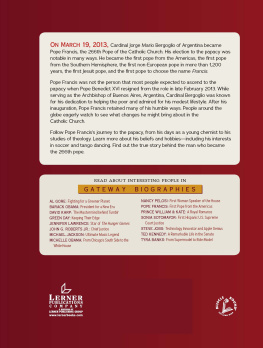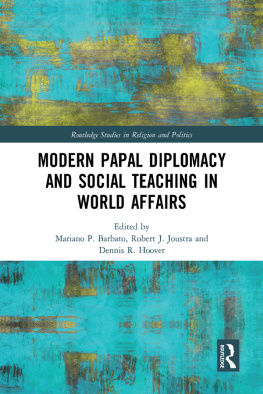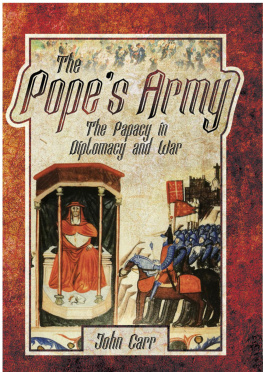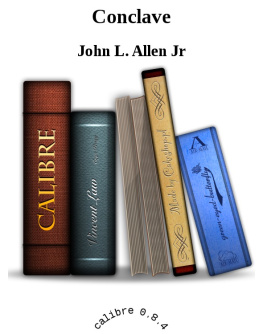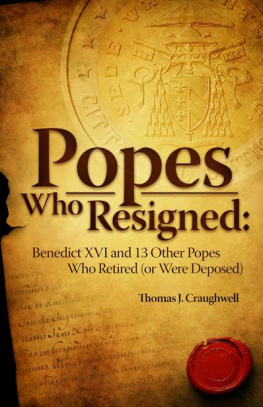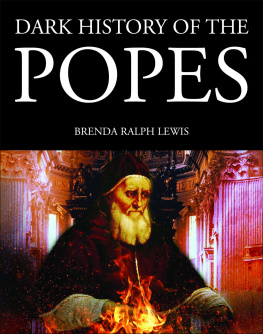THE PAPACY
IN THE
MODERN WORLD

The Papacy in
the Modern
World
A Political History
F RANK J. C OPPA
REAKTION BOOKS
Dedicated to Father Robert Trisco, in appreciation of advice given, judicious critiques offered, and above all for his friendship over the years.
Published by
Reaktion Books Ltd
33 Great Sutton Street
London EC1V 0DX, UK
www.reaktionbooks.co.uk
First published 2014
Copyright Frank J. Coppa 2014
All rights reserved
No part of this publication may be reproduced, stored in a retrieval system, or transmitted, in any form or by any means, electronic, mechanical, photocopying, recording or otherwise, without the prior permission of the publishers
Page references in the Photo Acknowledgements and
Index match the printed edition of this book.
Printed and bound in Great Britain
by TJ International, Padstow, Cornwall
A catalogue record for this book is available from the British Library
eISBN: 9781780233246
CONTENTS
Introduction: Harmony and Hostility between the Papacy and the Powers
T hou art Peter, and upon this rock I will build my Church, and the gates of hell shall not prevail against it. And I will give unto thee the keys of the Kingdom of Heaven: whatsoever thou shall bind on earth shall be bound also in heaven and whatsoever thou shalt loose on earth shall be loosed also in heaven.
The Petrine Doctrine, MATTHEW 16
IN EARLY NOVEMBER 2010, DURING A VISIT TO SPAIN,
Religion, Benedict stressed, had played an important role historically not only in Europe but also throughout much of the world. This was true for India, China and Japan in Asia; the Turco-Arabic, Muslim and Hebrew civilizations of the Middle East; the societies of sub-Saharan Africa and the cultures of the Americas, as well as the Christian civilizations in Europe and its colonies, under the leadership of the papacy, one of the worlds oldest institutions. Over the centuries the Holy See has aroused intense interest along with vocal opposition both within and outside the Church.
For centuries there were those who questioned Romes rule and challenged the nature, claims and basis of papal authority. Thus while some were grateful for the crucial role played by the Church and its leaders in the preservation some have said salvation of Western civilization, others were dissatisfied with the institution and those who directed it, and clamoured for change. something must be said about its long, and at times troubled past, as well as its accomplishments.
Over the centuries the papacy has confronted and survived a series of political, military, religious and ideological challenges, especially in Europe leading some to describe it as Eurocentric. These problems were fostered by the emergence of state sovereignty and the recourse of some popes to Renaissance pleasures and less-than-pious lifestyles, which contributed to the Reformation, followed by the wars of religion. Later, the Enlightenment, which championed reason over faith, created a host of new problems for the modern papacy, from the American and French revolutions to the present. Although the papacy has a long history and important past, this cannot be explored and discussed in detail here, for it would require not one but several additional volumes which reflects neither my interest nor my intention. On the other hand, this long papal past cannot be totally ignored, and is outlined briefly in the pages that follow.
From the first there was disagreement on the factors that contributed to the success of the Church and its leadership. There were those who attributed Christianitys rapid diffusion to outside forces, such as the Emperor Constantines Edict of Milan (Edictum Mediolanense) issued AD 313, some 1,700 years ago, which proclaimed religious liberty in the empire. In the words of the historian Giovanni Vian, [Constantine] made it possible for the Church to be what it is today.
The champions of the papacy perceived and praised its organizational expertise and cultural transmission as major factors in the development, preservation and eventual triumph of Western civilization. In fact, for many decades religious figures and secular leaders collaborated in re-establishing order in Europe, which was concretized in 962 when Pope John XII (95564) crowned Otto I Holy Roman Emperor, which proved advantageous for both. On the other hand, support for the papacy proved far more elusive in the Eastern empire, whose political structure survived and did not need the papacys massive intervention in civil society. Its clergy eventually rejected the Petrine Doctrine, which upheld and justified the claims of the bishops of Rome to direct the course of the universal Church. Disagreement over the papacys proclamation of its primacy and expanded role in Church, state and society led to dissension, and in 1054 contributed to the Great Schism between the Eastern and Western churches.
The papacy eventually faced problems not only in the East but in the West as well, where competition between the popes and the leaders of the reconstituted states led to conflict rather than cooperation. With the passage of time, the papal alliance with princes in their struggle for absolute power backfired, as did the theological justification for absolutism. Once political consolidation commenced under monarchical leadership in the countries of the Continent, the far-reaching educational, social and political practices and claims put forward by the papacy were challenged and checked, along with its unique and dominant role in the religious realm. Thus the princes as well as the emperor rejected the Unam sanctam (1302) of Boniface VIII (12941303), which insisted that all individuals, including kings and other rulers, were subject to the temporal authority of the pope. There were numerous reasons for the critique and curtailment of temporal papal power, including the desire and determination of political elements to establish their own churches free from papal control or supervision. Marsilio of Padua (12701303), in his Defensor pacis of 1324, presented the state as the sole defender of the political order.
In turn, the charge was launched that a number of Catholic powers sought to exploit the Curia, the College of Cardinals and even the pope to attain control of the Church in their territory.that troubled relations between Church and state in Central Europe.
While some rulers sought only autonomy from papal supervision, the more powerful aimed to choose and control the popes and relied on the cardinals they had recommended for inclusion in the College of Cardinals to prevent the selection of candidates they opposed for the office. They also called upon the French, German and Spanish cardinals to block the election of candidates they opposed, for their rulers claimed the Jus exclusivae or right to exclude a candidate from attaining the tiara. They were opposed by a second group of cardinals, usually named after the pope who had selected them and generally led by a papal nephew or other family member of that pope. Finally, a third group of cardinals emerged who determined to pursue an independent course and were popularly known as the Squadrone Volante, or Flying Squadron. The members of this third group pledged to resist the influence and bribes of the centralized states, but also attempted to limit papal power. Their task proved increasingly difficult. Problems also flowed from the Great Western Schism (13781417), in which three rival popes claimed the office, leading to the resignation of Gregory XII in 1415 the last pope to resign before Benedict XVI in 2013.

